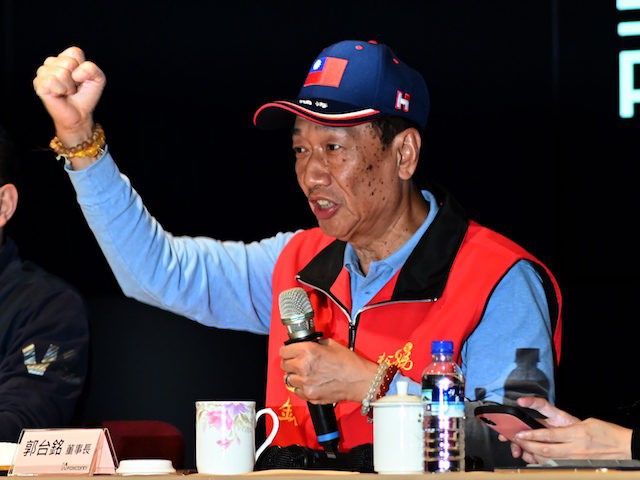Tech billionaire Terry Gou, founder and former CEO of the Hon Hai Technology Group — more commonly known as Foxconn — on Monday became the fourth contestant in Taiwan’s January presidential election.
Gou announced he will run as an independent this time around. The 72-year-old billionaire resigned as Foxconn’s CEO in 2019 and sought the nomination of the Kuomintang (KMT), Taiwan’s pro-China major party. He ran for the KMT nomination again this year but lost to New Taipei City mayor Hou Yu-ih.
Gou said in May he would support Hou’s candidacy, but last month he began holding campaign-style rallies in which he sharply criticized the incumbent Democratic Progressive Party (DPP), driving speculation he planned to enter the race as an independent.
At his campaign launch news conference, Gou once again unloaded on the DPP, claiming its policies have “brought Taiwan into the risk of war” and vowing not to “allow Taiwan to become the next Ukraine.”
“Give me four years and I promise that I will bring fifty years of peace to the Taiwan Strait and build the deepest foundation for the mutual trust across the strait,” he promised.
“Domestically, the national policy direction is filled with all sorts of mistakes. There’s no way to solve the difficulties of Taiwanese industry and people’s livelihoods,” he said.
Gou said he felt called to enter the race because he has not seen “substantive discussions of policy recently, especially on the topics of cross straits relations, economic development or international relations.”
Gou also promised to end “the era of entrepreneurs’ rule,” a somewhat odd boast for a tycoon whose $7 billion fortune depends heavily on supplying Apple with components manufactured in Foxconn’s controversial Chinese factories. It would be very difficult for Gou to argue that he does not have a direct financial interest in Taiwan’s relations with China.
Gou tried to flip that argument on its head at his press conference, insisting that China is so dependent upon him for Foxconn’s business that Beijing would not attempt to manipulate him. Foxconn is currently China’s largest single private employer.
Gou further argued that China would be committing economic suicide by confiscating Foxconn assets in the country because “no foreign investor will dare to invest” after such a heavy-handed maneuver. He cited Foxconn’s big customer Apple, and other famed companies like Tesla, Amazon.com, and Nvidia, who would react poorly if Beijing tried to pressure President Terry Gou by holding Foxconn hostage.
“How would the Chinese Communist Party explain to major global brands? Besides, its economy is terrible now,” he observed.
“I will not bow to China’s threats,” he declared.
“If the Chinese Communist regime threatens to confiscate the company’s property in China, I will say: ‘Yes! Please do it!’ I can sacrifice my personal wealth in exchange for peace for Taiwan,” he said.
Foxconn issued a statement after Gou’s press conference, saying its founder “already handed over the baton four years ago and no longer participates in the daily management of the company.”
Asked about his pledge to support Hou Yu-ih after losing the KMT nomination to him this year, Gou essentially suggested Hou and the other challenger in the race, Taipei Mayor Ko Wen-je of the Taiwan People’s Party (TPP), should drop out and unify behind him. He argued that he has the best chance of defeating the DPP’s candidate, current Vice President William Lai.
“I am the only entrepreneur with the practical management skills. I am an entrepreneur with nearly five decades of practical experience. Who else is better suited to lead Taiwan’s political sphere?” he asked.
The KMT released a statement shortly after Gou’s announcement saying it was “deeply regrettable” that Gou reneged on his pledge to support Hou. The KMT threatened disciplinary action against any of its members who support Gou during the presidential race.
The DPP, on the other hand, said it “fully respects Gou’s decision to run” and welcomed him into the race, although it asked him to avoid playing the “fear of war card” and dividing Taiwanese. The TPP said it expects Ko to remain the leading challenger against Lai.
Lai, who took up the DPP banner because President Tsai Ing-wen is not eligible to run for another term, is currently polling well ahead of his challengers. In fact, KMT’s Hou is running in third place, far behind the TPP’s Ko.
Gou has been tested in polls as a potential fourth candidate and has never managed to score higher than 20 percent against Lai, causing some analysts to wonder why Gou is jumping into the race and splitting the anti-DPP vote even further.
National Taiwan University professor Wang Yeh-lih told the Associated Press that Gou firmly believes he is the only candidate that can “unite the opposition,” no matter what the polls say.
Gou’s entry into the race is not guaranteed, as he needs 290,000 signatures on a petition before November 2 in order to qualify.

COMMENTS
Please let us know if you're having issues with commenting.